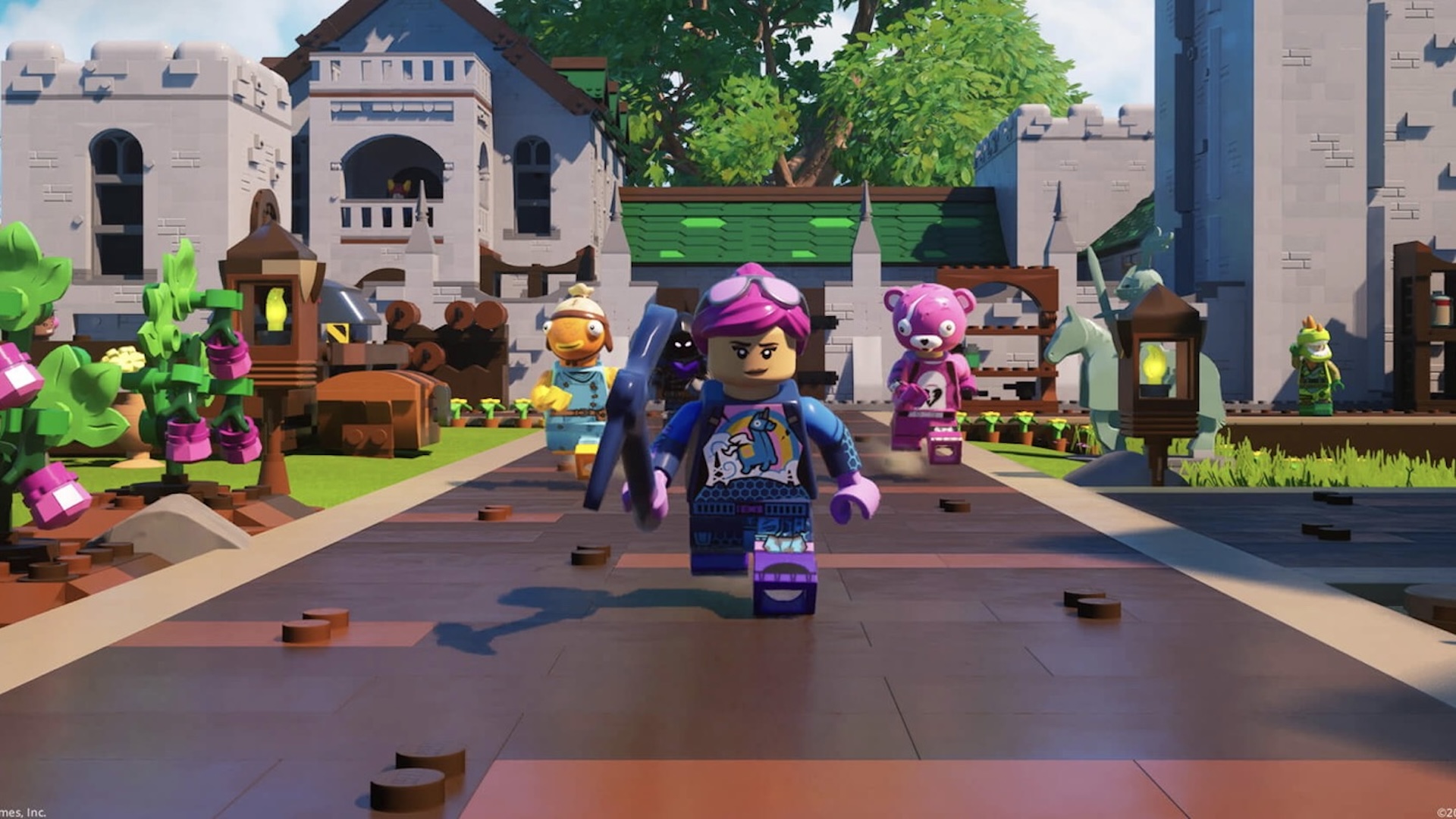TechRadar Verdict
Lego Fortnite is a solid swing at a survival crafting game, but will likely only fully come into its own after a few updates. Building is an issue at present, a real issue in a Lego title, but as a survival game, it’s excellent.
Pros
- +
Gorgeous open world
- +
Lego Styles are genuinely delightful
- +
Progression loop is devilishly moreish
Cons
- -
No split-screen co-op
- -
Building is clunky and drawn out
- -
No farming at launch is a missed opportunity
Why you can trust TechRadar
Platform reviewed: PS5
Available on: PS5, PS4, Xbox Series X|S, Xbox One, Nintendo Switch, PC, Android
Release date: December 7, 2023
Lego Fortnite marked the pinnacle of an extremely important week for Fortnite last week; not one, not two, but three new games were released within Fortnite, with the Lego-focused entry leading the way. It’s a survival crafting game that’s more than a little bit like Minecraft, and it’s being marketed as a full game that ‘lives in Fortnite,’ a claim that does raise the eyebrow somewhat. However, this essentially holds up; Epic Games and Lego have put together a competent, approachable, and surprisingly moreish survival crafting game for no additional cost. It’s missing a few features that you’d expect from this sort of game, but it’s well worth trying out with friends.
The fact that Lego Fortnite is a fully featured game released within the biggest battle royale game around is noteworthy, and pretty much unprecedented, at least at this scale. It’s free too, and tied into Fortnite's existing experience points (XP) systems. You can hop into Lego Fortnite, and earn XP towards your main Battle Pass, before jumping into one of the other hundred or so modes. It really is unlike anything I’ve seen before, and likely just Epic Games’ first step towards crafting Fortnite into a one-stop destination for a range of gaming experiences.
Part of what makes Lego Fortnite such a compelling proposition for existing players is how seamlessly it’s been folded into Fortnite’s world. There are 1,200 Lego skins at launch, based on those already found in Fortnite. I first spent ages looking through my Outfits, checking which ones had Lego styles and which didn’t. Seeing Lego versions of iconic Fortnite characters like Peely, Fishstick, and Jonesy never really gets old, and it’s genuinely mind-blowing just how many skins Lego and Epic have managed to put together. You can also use many of your favorite emotes, and it’s a real joy to see how Lego characters move when certain ones are triggered.
Begin at the beginning
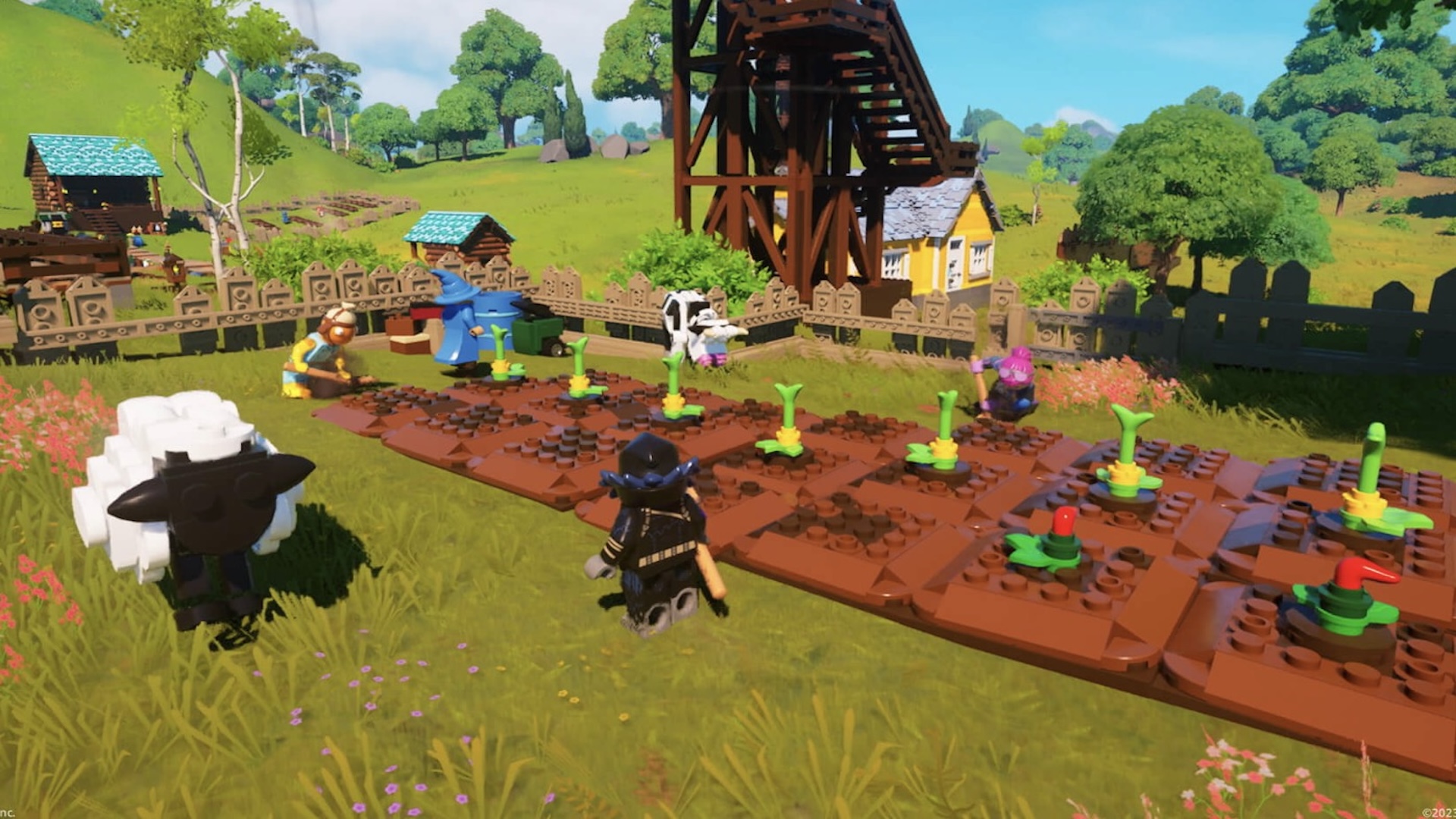
Lego Fortnite’s opening hour walks you through the basics, leading you from punching down trees with your plastic Lego hands, to building your first shelter. Lego Fortnite is immediately striking, utilizing the very best of what Unreal Engine 5 has to offer. Strangely, this is probably the best-looking Lego game released so far, combining Fortnite’s vibrant color palette with the shiny, plastic real-life look of Lego bricks. You’ll spawn into a randomly selected spot in the world, or you can enter a seed if you have somewhere more specific in mind. Over the following hours, you’ll be well on your way to building and managing your very own Fortnite village, with an ever-changing cast of characters that’ll visit and join in the fun.
Lego games are often some of the most approachable and easy to understand, making them excellent for a younger audience. Lego Fortnite is a great example of this, with an easy-to-understand gameplay loop and control system. Unfortunately, this sense of streamlined simplicity does not extend to building, which feels overbaked in its current state. Each build has multiple stages, each stage with multiple pieces that need to be placed onto a defined grid. While this is clearly a nod to how Lego is put together in the real world, it’s completely out of place here. Large builds can take ages to complete and, due to the placement of objects being a little finicky at times, often feel frustrating.
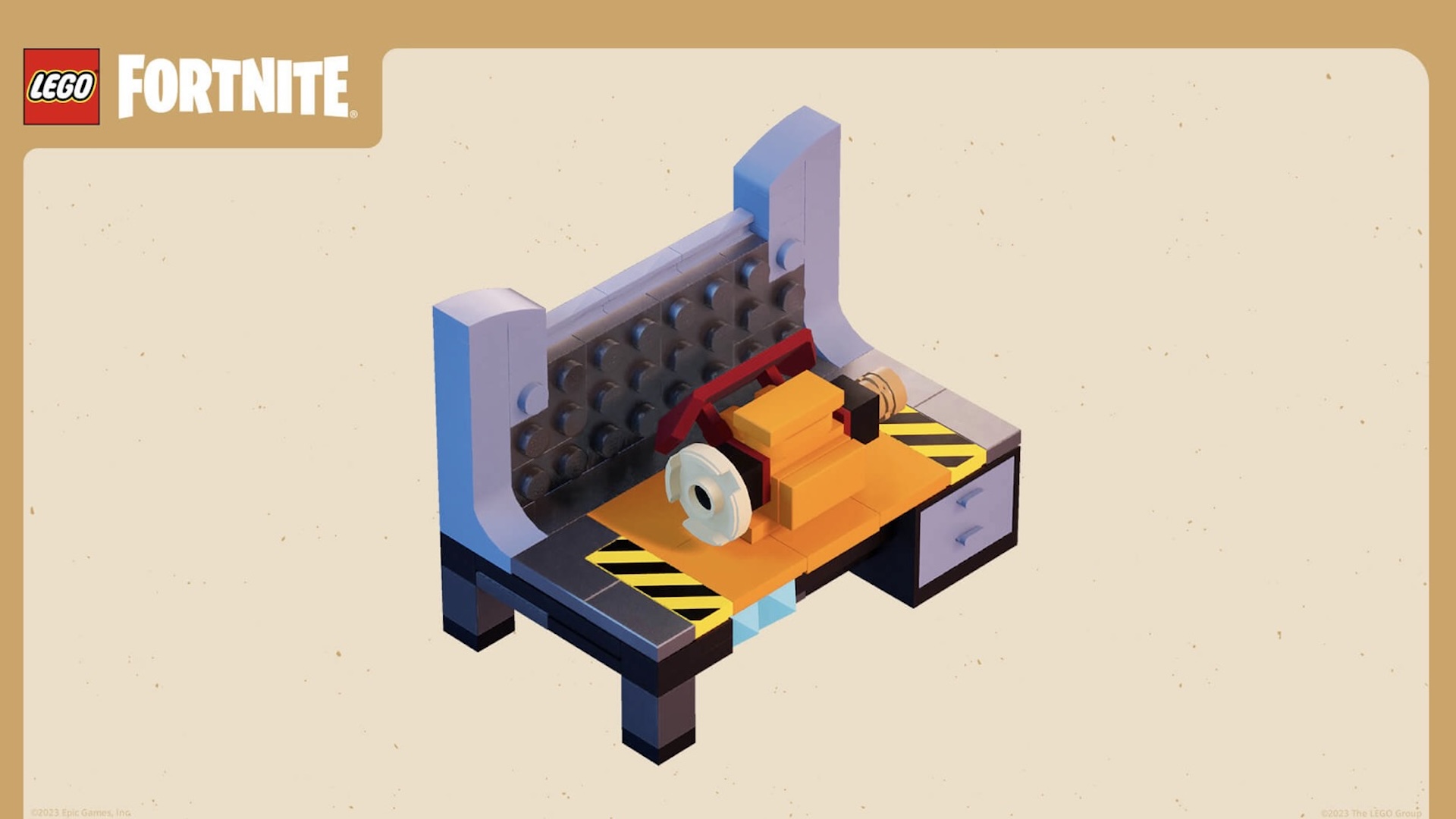
Unlocking the glider completely opens Lego Fortnite up. You can use geysers to soar up into the air, allowing you to reach previously inaccessible resources. Make sure you get your plastic little mitts on it as soon as you can.
Over on the survival side of things, there’s a hunger and temperature meter and fairly easy-to-understand third-person melee combat. There’s a great-feeling dodge roll and even a way to stun enemies with a well-timed shield block. You’ll need to eat to keep your health up, but the balance is a little bit out of whack at present. It can feel overbearing at times, with constant reminders of your character’s hunger before you stand still munching berries to stave it off for 10 minutes or so. Similarly, your temperature will drop dramatically when it’s raining, meaning you’ll need to wait inside or risk losing health. This does get better as you craft charms that add heat and cold resistance, but the first few hours are rough.
Upgrades, people
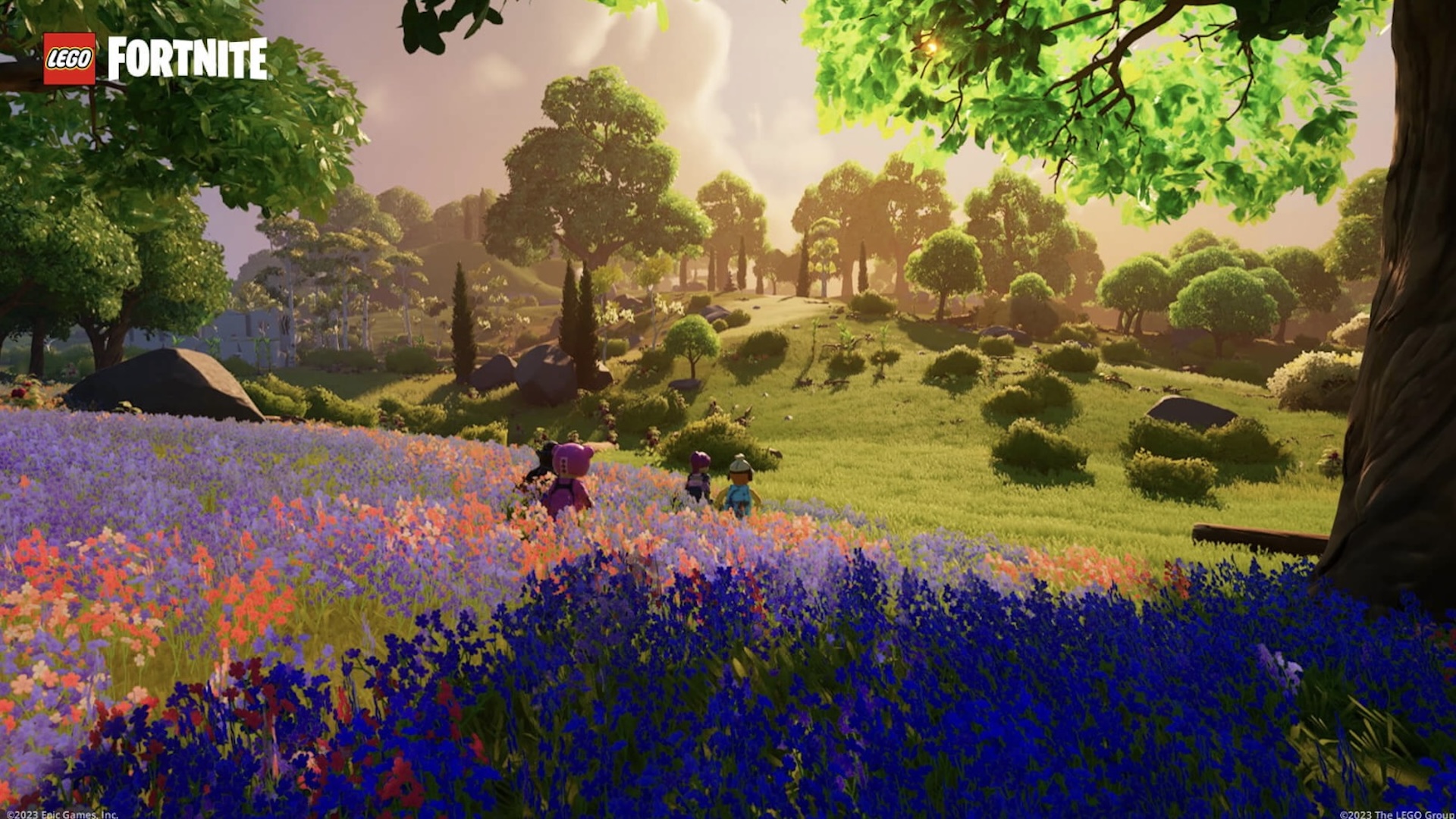
The auto-build mechanic found in other Lego games would really fit into Lego Fortnite, and help alleviate what is currently a very annoying building system. There’s no real build camera either, meaning you need to walk around a large building, looking up at certain spots in order to place individual parts. It’s a shame that Lego Fortnite misses the mark in its building, especially given how fun it is in other Lego games. Generally, crafting and resource gathering are much better, with a clear and defined loop associated with crafting tools to gather resources of escalating rarity.
As a survival crafting game, Lego Fortnite is excellent. As a Lego game, it’s a little bit lacking. You cannot move buildings and instead need to destroy them and go through the lengthy building process all over again. Villages feel messy and cramped as a result, and there’s very little room for experimentation and play, something that really doesn’t mesh with Lego’s main strengths. Another missed opportunity is the lack of split-screen co-op. This is present in some of Fortnite’s main modes, so its absence is especially puzzling here. Lego games are some of the best ways to play alongside younger family members (in particular), making Lego Fortnite a difficult game to recommend for those with children who like to play together in the same room.
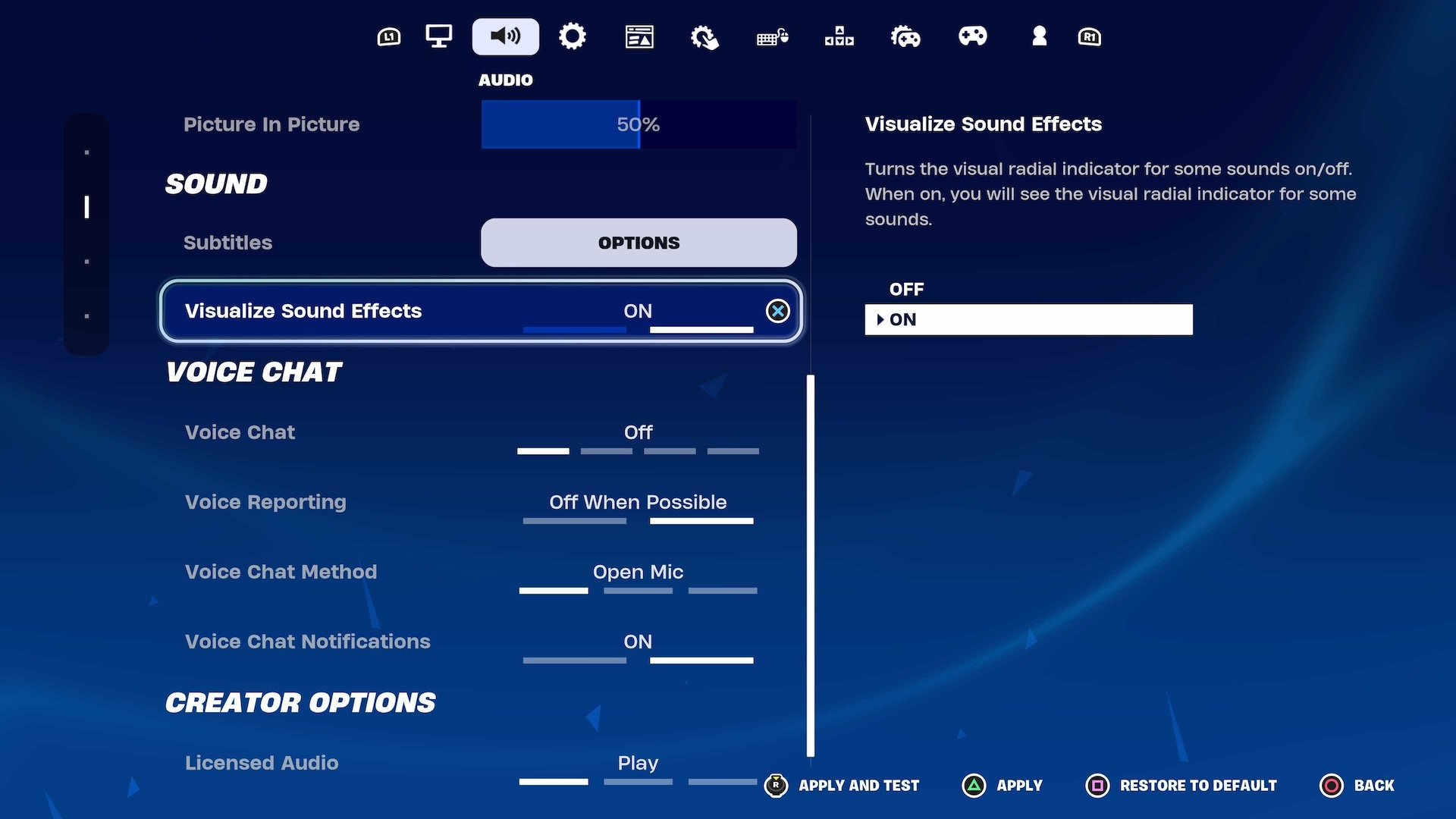
Lego Fortnite shares Fortnite’s Accessibility settings, which means they’re slightly too buried in menus. Still, there’s a sound visualizer, completely remappable controls, as well as some HUD scaling options.
There are many quality-of-life changes I’d like to see brought to Lego Fortnite in the future, and well, this is Fortnite, so updates are very likely. You’ll probably be surprised to know that farming animals is currently not possible in Lego Fortnite, making certain resources difficult to get ahold of. This creates bottlenecks in your plans, grinding progression to a halt for hours at a time. Generally, though, the gathering, crafting, and progression loop in Lego Fortnite is precisely what it needs to be. You’ll gather better resources to craft better tools that allow you to reach even better resources in different and more dangerous biomes. It’s incredibly moreish, and my group of friends has already had trouble logging off at the end of a long play session. Perhaps just one more expedition before bedtime.
I have no doubt that Lego Fortnite will be supported and updated in the future, and generally, there’s more than enough here to warrant its claims of being a full game. Like everything else in Fortnite’s ecosystem, Lego Fortnite is incredibly slick, solid, and extremely good value. It’s a riot in four-player co-op, though you’ll need to head online to squad up with friends. As a swing at being a Minecraft competitor, Lego Fortnite has heaps of potential. In its current state, it actually reminds me more of Valheim, with a clear and rewarding progression loop that’ll keep you coming back for hours and hours.
We've pulled together all the best free games if you're searching for another adventure to sink hours into. However, for a more communal experience, you might want to check out all the best multiplayer PC games, too.
Jake is a freelance writer who currently works regularly with TRG. Hailing from the overcast shores of Brighton in the United Kingdom, Jake can be found covering everything from features to guides content around the latest game releases. As seen on NME.com, Eurogamer.net, and VG247.com, Jake specializes in breaking games down into approachable pieces for guides, and providing SEO advice to websites looking to expand their audiences.
